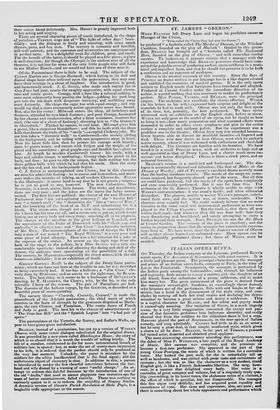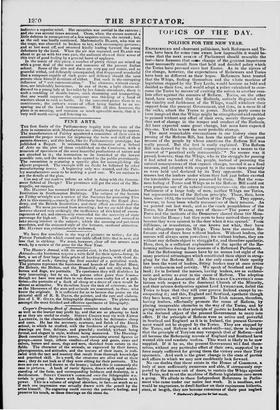ITALIAN OPERA BUFFA.
ON Thursday, the Italian company at the Lyceum, performed Rim's comic opera, Un' Avveatura di Searamuccia, with great success. It is a lively and pleasant piece. The principal characters are the manager and actors of an Italian opera buffa, company at Paris, in the time of Louis the Fourteenth. Scaramuccia, the manager, is patronised by the Italian party among the fasbionables; and, through his influence and ingenuity, finds means to rescue a country girl, the daughter of an old friend, from the seductions of a young nobleman, and to make him marry her. The great amusement of the piece is derived from the manager's servant-girl, Sandrina, an exceedingly clever damsel, who becomes one of the performers, flirts with and laughs at her ad- mirers, has a hand in the denouement of the main story, and con- eludes by turning off both her rival swains and declaring her deter- mination to become a great actress and marry a nobleman. This is a capital character for BLASIS; and her whim and gayety made it exceedingly amusing. Her imitation of Gals', in a mock tragedy scene, by a very little exaggeration converted the energy and pas- sion of that favourite performer into ludicrous absurdity, and really showed that from the sublime to the ridiculous there is but a step. RoNcom played the part of Searamuccia, in the true spirit of Italian comedy, and sang admirably. CATONE had little to do as an actor ; but he sang a great deal, in that simple, unaffected style, which gives a charm to all he does. BELLINI, in the part of Tomaso, a peasant lad turned actor, deserved and obtained great applause.
The most interesting circumstance attending this performance, was the debut of Miss F. Wvsonam, a late pupil of the Royal Academy of Music. Her success was complete, and she promises to become a first-rate performer. She appeared in the part of the young Count Pontigny, the music of which is written for a contralto voice. She looked the part well, for she is remarkably tall as well as handsome, and was attired with great taste and correctness of costume; but she was as like the character as a very modest, timid English girl, is like a French fashionable libertine. She sang, how- ever, in a manner that delighted every body. Her voice is a contralto, of great compass and volume, but of a singularly reedy qua- lity, (resembling, in its lower tones, the chalumeau notes of a clarinet,) the effect of which is peculiar, but not disagreeable. She manages this fine organ very skilfully, and has acquired great equality and smoothness of tone. Her taste and expression, also, are pure ; and there is something about her whole appearance and performance which indicates a superior mind. Her reception was cordial in the extreme ; and she was several times encored. Once, when the encore seemed a little dubious in consequence of a few negative voices, she retired ; but, as the call was loudly continued, Mademoiselle BLASIS, who was on the stage, was observed to beckon to her, with encouraging gestures ; and at last went off, and returned kindly leading forward the young debutante by the hand. When the air was repeated, and SLAMS was about to go on with her own part, the audience showed their sense of this trait of good feeling by a general burst of applause.
In the music of this piece, a number of pretty things are mixed up with a great deal of the noise and nonsense of the present Italian school. Some of the airs and duets are very gay and comic, arid so graceful withal, and delicately accompanied, that it appeared wonderful that a composer capable of such grace and delicacy should the next minute show himself destitute of either. But such is the corrupting influence of " evil communication." The choruses, without excep-
tion, are intolerably boisterous. In one of them, a light chorus ad- dressed to a young lady at her toilet by her female attendants, there is such a rumbling of double-basses, such drumming and trumpetting, that one would suppose the composer was thinking of a band of warriors about to rush to battle. In the concerted pieces there is tio contrivance; the author's means of effect being limited to an un-
sparing use of the loud instruments. With all this, however, the piece is so amusing, and contains so much agreeable music, that it is very well worth seeing and listening to.























 Previous page
Previous page